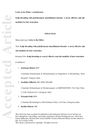 October 2023 in “Bioactive Materials”
October 2023 in “Bioactive Materials” The new hair loss treatment combining nitric oxide and minoxidil in a special carrier is effective for hair regrowth.
 127 citations,
December 2005 in “Experimental Dermatology”
127 citations,
December 2005 in “Experimental Dermatology” Stress can stop hair growth in mice, and treatments can reverse this effect.
4 citations,
May 2022 in “International journal of molecular sciences” Heat-killed Enterococcus faecalis EF-2001 may promote hair growth and transition hair follicles to the growth phase.
August 2024 in “Cosmetics” Personalized treatments for hair loss are becoming more effective by using genetic information.
 December 2021 in “Journal of Applied Biological Chemistry”
December 2021 in “Journal of Applied Biological Chemistry” Toothpaste containing α-tocopherol acetate, l-menthol, and stevioside can promote hair growth in mice.
 14 citations,
April 2021 in “Heliyon”
14 citations,
April 2021 in “Heliyon” Pomegranate leaf extract may help with hair growth, dandruff, and lice.
 1 citations,
June 2021 in “General physiology and biophysics”
1 citations,
June 2021 in “General physiology and biophysics” Minoxidil relaxes rat blood vessels mainly through nitric oxide and potassium channels.
 16 citations,
January 2019 in “Skin appendage disorders”
16 citations,
January 2019 in “Skin appendage disorders” Intralesional corticosteroids work best for mild alopecia areata, and DPCP works best for moderate to severe cases.
August 2024 in “International Journal of Biological Macromolecules” New gels using cellulose nanocrystals effectively deliver minoxidil to hair follicles, promoting hair regrowth.
 September 2024 in “Health of Man”
September 2024 in “Health of Man” Low-dose dutasteride effectively and safely promotes hair growth in men with androgenetic alopecia.
 September 2004 in “PubMed”
September 2004 in “PubMed” Androgenetic alopecia, or hair loss, is influenced by hormones and genetics, and can be treated with medications like minoxidil, finasteride, or hormone therapy, with effectiveness evaluated after 6 months.
 December 2022 in “Small methods”
December 2022 in “Small methods” A new hair loss treatment using dissolving microneedles was found to speed up hair growth and was more effective than daily use of common hair growth drugs.
 7 citations,
September 2020 in “Journal of Cosmetic Dermatology”
7 citations,
September 2020 in “Journal of Cosmetic Dermatology” Minoxidil and Finasteride are the most popular hair loss treatments, with rising interest in other options, and economic or health crises can change what treatments people prefer.
 182 citations,
December 2017 in “Journal of the American Academy of Dermatology”
182 citations,
December 2017 in “Journal of the American Academy of Dermatology” Some treatments can help with a hair loss condition called alopecia areata, but none ensure lasting results; choices depend on the person, with JAK inhibitors showing promise for severe cases.
4 citations,
March 2022 in “Journal of cosmetic dermatology” The mixed preparation helped hair regrowth but wasn't better than minoxidil.
 15 citations,
January 2000 in “Japanese Heart Journal”
15 citations,
January 2000 in “Japanese Heart Journal” A man developed heart problems after using a baldness treatment for 4 months, suggesting that people with heart issues should avoid this treatment.
 11 citations,
January 2018 in “RSC Advances”
11 citations,
January 2018 in “RSC Advances” Cedrol cream is more effective and safe for promoting hair growth than traditional treatments.
 April 2024 in “Indian journal of ophthalmology. Case reports”
April 2024 in “Indian journal of ophthalmology. Case reports” Using minoxidil for hair loss might rarely cause a vision problem where fluid builds up under the retina.
 December 2024 in “Planta Medica”
December 2024 in “Planta Medica” Certain plants may help hair growth in alopecia.
 December 2024 in “Frontiers in Pharmacology”
December 2024 in “Frontiers in Pharmacology” Araliadiol may promote hair growth like minoxidil without being toxic.
 November 2019 in “Journal of Aesthetic Nursing”
November 2019 in “Journal of Aesthetic Nursing” The article concludes that a thorough diagnosis and treatment plan, including medications, non-invasive methods, or surgery, is important for managing hair loss, with a combination of minoxidil and finasteride being particularly effective.
 October 2023 in “Journal of Drug Delivery Science and Technology”
October 2023 in “Journal of Drug Delivery Science and Technology” Electrospun nanofibers might be a promising new treatment for hair loss.
January 2021 in “대한본초학회지(본초분과학회지)” Achyranthis Radix ethanol extract helps hair grow.
 September 2016 in “Faculty Opinions – Post-Publication Peer Review of the Biomedical Literature”
September 2016 in “Faculty Opinions – Post-Publication Peer Review of the Biomedical Literature” Once-daily 5% minoxidil foam increases hair regrowth and density in women with hair loss, but not as effectively as twice-daily 2% minoxidil solution, though it's safer and more convenient.
 April 2020 in “Dermatology and therapy”
April 2020 in “Dermatology and therapy” New 5% minoxidil solution improves scalp hydration, reduces redness, and may be safer for sensitive users.
 11 citations,
May 2017 in “Journal of The European Academy of Dermatology and Venereology”
11 citations,
May 2017 in “Journal of The European Academy of Dermatology and Venereology” Scalp threading with polydioxanone threads is a promising, effective, and safe method for hair regrowth.
 35 citations,
September 2017 in “PubMed”
35 citations,
September 2017 in “PubMed” The document concludes that hair loss has many causes and treatments vary, including medication for pattern baldness and addressing underlying issues for other types.

Pimpinella anisum L. extract significantly boosts hair growth in mice.

Off-label drug use can be risky but sometimes beneficial when standard treatments fail.

Various substances, quitting smoking, and certain topical applications can enhance the survival of skin flaps used in surgery. Oxygen-free radicals play a role in tissue injury, but certain treatments can have beneficial effects.
























